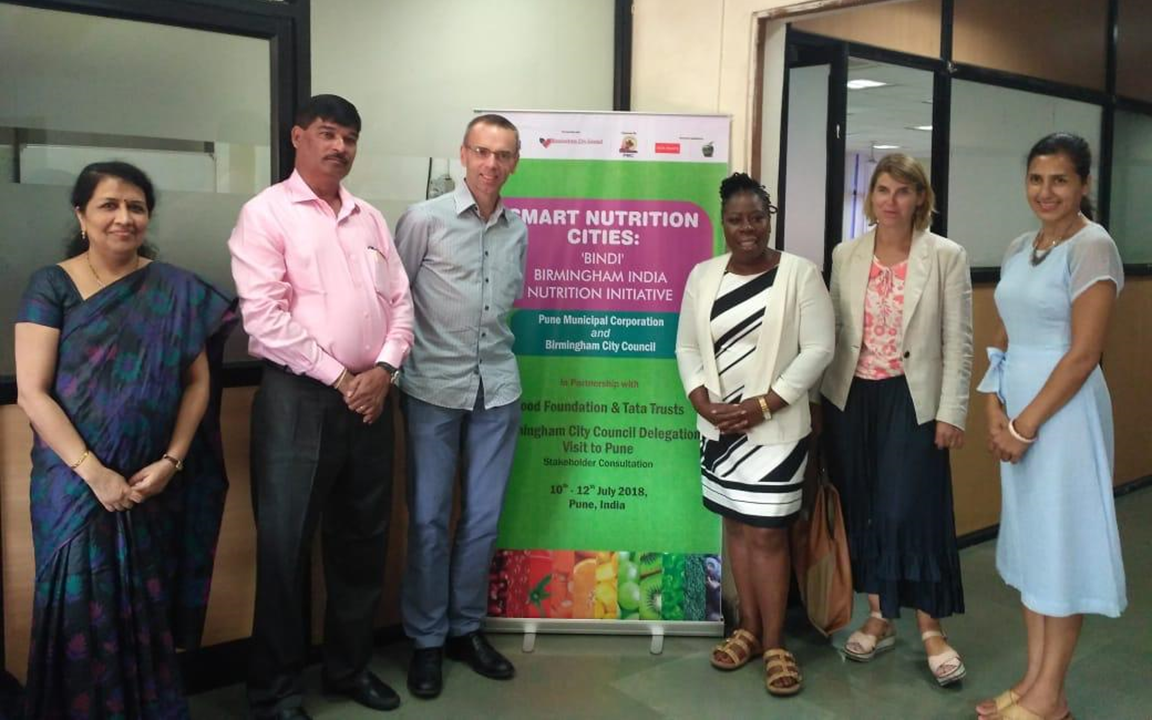The Birmingham India Nutrition Initiative (BINDI) is a ‘Nutrition Smart City’ initiative, which involves the development of relevant policies and practices through a learning partnership between Birmingham, United Kingdom (UK), and Pune, India. The two cities are developing a platform to enable joint learning, experience sharing and pilot specific initiatives. This report and the case studies within are intended to be used as inspiration for the developing BINDI partnership.
The process of urbanisation is closely linked to dietary transition, and as the global urban population grows, city environments will become increasingly important for helping to promote healthy and adequate diets. Globally, many cities have committed to reshaping the city food system, with approaches ranging from urban agriculture to planning for healthier retail to social justice initiatives that aim to link the poor more directly into productive urban livelihoods.
There are also an estimated 300 cities globally that want to become ‘smarter’ and develop more liveable city environments through data, technology and energy efficiency (Anthopoulos, 2017). As with urban food initiatives, the Smart City covers a wide range of definitions and approaches. Many of these are outlined in the ‘Background’ section.
The purpose of this report is to document and learn from cities where the concepts of urban food and Smart Cities have been jointly applied. Our definition of a ‘Nutrition Smart City’ is one that uses data and technology to change the way that food is produced, processed, distributed and consumed. It considers food quality and equitable access, disrupting food systems that are not sustainable or that contribute to food insecurity and malnutrition.
The case studies in this report cover the domains of governance, social and economic equality, food production, food supply and distribution, food waste and sustainable diets and nutrition—the six topics in the Milan Urban Food Policy Framework for Action. Collectively, the case studies illustrate how cities can adopt approaches that use procurement, planning and a range of e-platforms and applications to drive changes in production, supply and production of food whilst contributing towards ‘Smart’ and nutrition goals. They also demonstrate the fundamental overarching role that people can play in ensuring the right priorities and plans are put in place and in driving leadership and policy coherence.
This report makes a case for building on the experiences of cities which are improving their food system and/or are becoming Smart and makes a case for Nutrition Smart Cities, which tackle all forms of malnutrition (undernutrition and overweight and obesity) through adopting Smart approaches. Our review found few examples of cities which are adopting Nutrition Smart approaches, though there is a considerable body of experience which can be drawn upon from urban food initiatives and Smart Cities.
The case studies presented demonstrate that Smart approaches can be applied across the supply chain, from enhancing food production in urban and peri-urban areas to the engagement of citizens in the development of food policy, with the goal of improving nutritional outcomes. Moreover, they show that it is possible to align the goals of healthier and more sustainable food systems in multiple ways through city food policy and to do this in a manner which harnesses technological innovation and new sources of data to drive more efficient systems. The case studies show that cities can act in multiple ways, even if they do not have a supportive national policy framework. These lessons learned will be applicable to other cities in a variety of contexts.
Through collaborating on this report, the members of BINDI have made a start on developing their learning partnership. The body of experience globally is developing day by day, and BINDI will undoubtedly uncover new examples which can be learnt from as the partnership progresses.


